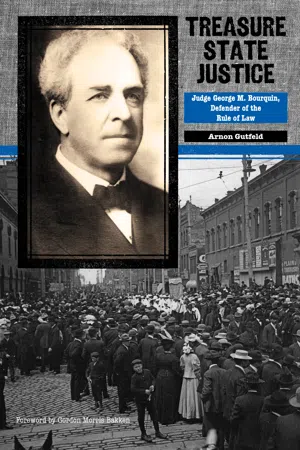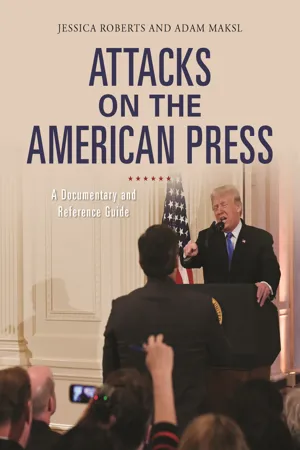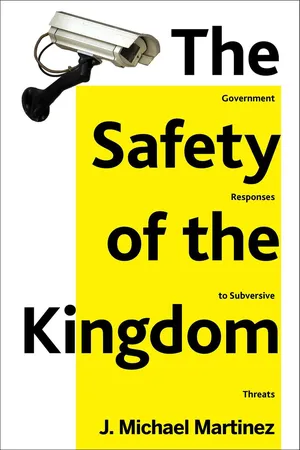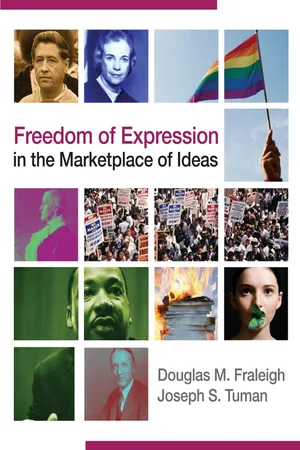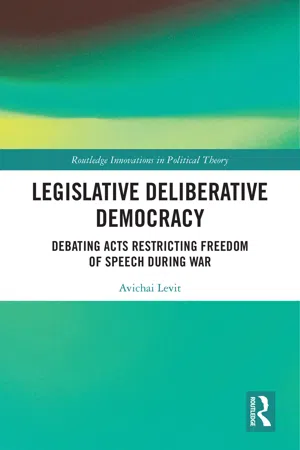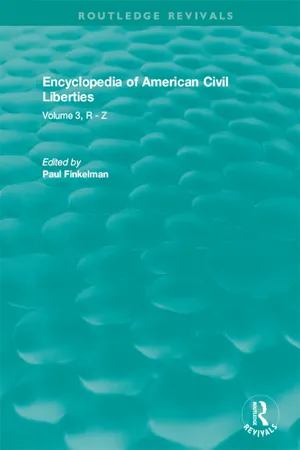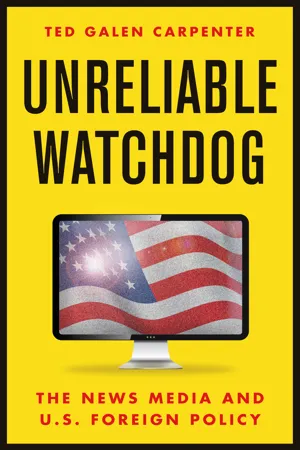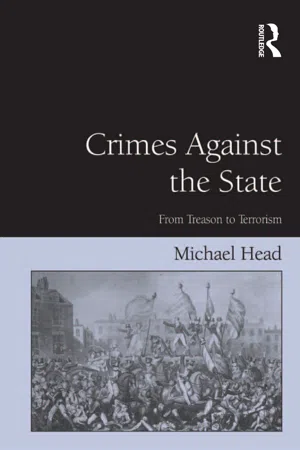History
Sedition Act of 1918
The Sedition Act of 1918 was a U.S. law that made it illegal to criticize the government, the Constitution, the military, or the flag during wartime. It was enacted during World War I and was aimed at suppressing dissent and opposition to the war effort. The act was controversial and led to numerous arrests and prosecutions of individuals expressing anti-war sentiments.
Written by Perlego with AI-assistance
Related key terms
Related key terms
1 of 4
Related key terms
1 of 3
10 Key excerpts on "Sedition Act of 1918"
- eBook - ePub
Treasure State Justice
Judge George M. Bourquin, Defender of the Rule of Law
- Arnon Gutfeld(Author)
- 2020(Publication Date)
- Texas Tech University Press(Publisher)
54The Sedition Act was designed to stop dissent. On May 28, 1918, the Anaconda Standard correctly interpreted its significance: “There is no freedom of speech any longer for the disloyal or pro-German. A man can talk all he pleases if he talks right.” Thus, an alleged violation of a federal law in a small town in Montana, a courageous decision by a judge who could not be intimidated by a patriotic mob, and the extraordinary hysteria that engulfed a state and a nation contributed in large measure to the passage of one of the most stringent anti–free speech acts in American history.The events of 1917–18 left an indelible impression on many of the primary actors involved. Burton K. Wheeler, for example, wrote: “One reason why I was oppose [sic] to F.D.R. packing the Supreme Court in 1937 was because of my experience during that time [World War I]—the local courts were crazy; only…Judge Bourquin and a few other local Federal Courts stood up.”55 Wheeler was correct; very few in the legal profession opposed the national hysterical “patriotic” orgy.56Brutal stifling of the rights guaranteed by the Constitution followed the passage of the Sedition Act of 1918.57 The act stemmed from local and national fears of radicals compounded by astute manipulation of patriotic feelings by business interests within a nation at war. President Wilson's Mediation Commission concluded that the unrest in the mining and lumber industries had not been the result of treasonable plots by the IWW but rather was triggered primarily by employers dealing with “unremedied and remediable industrial disorders.”58 The Justice Department, recognizing the wide scope of the act and the danger to individual liberties inherent within it, urged district attorneys to enforce the act with discretion. The department did not want wholesale suppression of legitimate criticism of the government.59 - eBook - ePub
Attacks on the American Press
A Documentary and Reference Guide
- Jessica Roberts, Adam Maksl(Authors)
- 2021(Publication Date)
- Greenwood(Publisher)
1 THREATS TO THE PRESS DURING WARTIMEPassage contains an image
“Scandalous and Malicious Writing or Writings against the Government of the United States”DOCUMENT An Act in Addition to the Act, Entitled “An Act for the Punishment of Certain Crimes Against the United States.”•Document 1: The Sedition Act of 1798•Date: July 14, 1798•Where: Philadelphia, Pennsylvania•Significance: Passed narrowly by Congress under Federalist control in 1798, the law permitted the government to punish speech seen as critical of the federal government, the president, or Congress. The act, which was allowed to expire fewer than three years after its passage, was criticized as being unconstitutional. Though never directly tested before the Supreme Court, the highest court issued several other rulings in the twentieth century indicating that the short-lived law would likely run afoul of the rights guaranteed by the First Amendment to the U.S. Constitution.SECTION 1. Be it enacted by the Senate and House of Representatives of the United States of America, in Congress assembled, That if any persons shall unlawfully combine or conspire together, with intent to oppose any measure or measures of the government of the United States, which are or shall be directed by proper authority, or to impede the operation of any law of the United States, or to intimidate or prevent any person holding a place or office in or under the government of the United States, from undertaking, performing or executing his trust or duty, and if any person or persons, with intent as aforesaid, shall counsel, advise or attempt to procure any insurrection, riot, unlawful assembly, or combination, whether such conspiracy, threatening, counsel, advice, or attempt shall have the proposed effect or not, he or they shall be deemed guilty of a high misdemeanor, and on conviction, before any court of the United States having jurisdiction thereof, shall be punished by a fine not exceeding five thousand dollars, and by imprisonment during a term not less than six months nor exceeding five years; and further, at the discretion of the court may be holden to find sureties for his good behaviour in such sum, and for such time, as the said court may direct. - eBook - ePub
The Safety of the Kingdom
Government Responses to Subversive Threats
- J. Michael Martinez(Author)
- 2015(Publication Date)
- Carrel Books(Publisher)
Chapter 3 THE ESPIONAGE ACT OF 1917 AND THE Sedition Act of 1918—SENATOR ROBERT M. FOLLETTE SR.,I think all men recognize that in time of war the citizen must surrender some rights for the common good which he is entitled to enjoy in time of peace. But, sir, the right to control their own government according to constitutional forms is not one of the rights that the citizens of this country are called upon to surrender in time of war.FROM THE FLOOR OF THE US SENATE , OCTOBER 6, 1917108W ar changes nations and people in ways unimaginable before hostilities commence. When fighting breaks out, political leaders sometimes feel compelled to suppress dissent because negative comments about the government or its military supposedly embolden the enemy and undermine national morale. Yet the notion of a loyal opposition that dares to speak the truth to power is the hallmark of a republican form of government. Stifling dissent presents a danger to the republic that sometimes equals the threat posed by foreign belligerents. Distinguishing between legitimate criticism and speech that creates a clear and present danger to the safety and security of the regime can be difficult in peacetime. During wartime, the task is complicated by inflamed passions as well as rational and irrational fear of the enemy.The US response to the Great War, as it was called before people knew global conflicts would require numbering, presented a clear example of the damage caused by government responses to fears of foreign elements. The war years were worrisome for many Americans. They watched, horrified, as casualty figures rolled in from across the Atlantic. The European War of 1914 to 1918 was directly or indirectly responsible for 37 million deaths. Of that total, more than one hundred seventeen thousand were Americans. Although the number of American dead paled in comparison to the millions of Europeans who perished, the carnage nonetheless shocked the citizenry. Why had the nation’s solders paid so high a price? Surely muddy, blood-soaked acreage in Belgium, France, and Germany was not worth the lives of a generation of young men who did not even live on the European continent.109 - eBook - ePub
No Law
Intellectual Property in the Image of an Absolute First Amendment
- David L. Lange, H. Jefferson Powell(Authors)
- 2008(Publication Date)
- Stanford Law Books(Publisher)
8Both proposals, as well as a related one permitting the postmaster general to exclude from the mails any writing “of a treasonable or anarchistic character,” provoked strong reactions in Congress and, particularly with respect to the press censorship provision, in the press. Critics of the legislation attacked these provisions as an effort to reprise the 1798 Sedition Act, and their invocation of that statute’s lingering bad odor as an act of unconstitutional oppression proved effective enough to force the administration and its allies to settle for a less far-reaching statute than they preferred. In the end, the House of Representatives defeated the censorship provision, and Congress modified the language of the other speech-restrictive sections in an apparent effort to confine the bill’s intrusion into free expression. Nevertheless, as finally approved the Act created three new federal offenses which bore directly on freedom of expression: Section 3 of Title I of the Act made it a crime, during wartime, for anyone “to make or convey false reports or false statements with intent to interfere” with military operations, to “cause or attempt to cause insubordination, disloyalty, mutiny, or refusal of duty, in the military or naval forces of the United States,” or to “obstruct” the recruitment or enlistment of military personnel.9The 1917 Congressional deliberations over the Espionage Act were reminiscent of the 1798 House debates over the Sedition Act, but only up to a point. The Republican opposition of 191710 provided most of the criticism and most of the votes to defeat the press censorship provision, but most Republicans wished only to soften, not to defeat the proposed legislation, and President Wilson’s fellow Democrats in turn were not monolithic in support of the administration’s preferences. The 1917 Act did not play the polarizing role in political-party ways which the 1798 Act had done. Nevertheless, the Espionage Act—the first federal seditious libel legislation since 1798—clearly raised, for many people, issues akin to those presented by the Sedition Act. “Never in the history of our country, since the Alien and Sedition Laws of 1798, has the meaning of free speech been the subject of such sharp controversy as to-day,” civil libertarian Zechariah Chafee, Jr. wrote in the middle of the discussion.11 - Douglas Fraleigh, Joseph S. Tuman(Authors)
- 2010(Publication Date)
- SAGE Publications, Inc(Publisher)
CHAPTER 4 National Security and Freedom of Expression T he Sedition Act of 1798 was the first major government effort to limit free speech on national security grounds, but it would not be the last. The claim that free expression must be sacrificed is typical during times of war and crisis. As you have read in Chapters 2 and 3, the Lincoln administration limited expression during the Civil War, as did the Wilson administration during World War I. Free speech was threatened during the Cold War, the Vietnam War, and most recently in the aftermath of the attacks on September 11, 2001. Advocates of free expression argue for a robust marketplace of ideas during times of crisis. The First Amendment is premised on the assumption that society can make the best decisions about the actions of our government officials when free expression is unrestrained. 1 In a democratic government, the people decide whether the justifications that their leaders advance for fighting a war are accurate and acceptable. They may debate whether our forces are fighting the war in a manner that is effective and ethical. Citizens who oppose the war should be free to express their viewpoint without being deterred by government surveillance. The people are entitled to have access to government information about the reasons for war and the progress of the war so they can make good decisions about whether the conflict is worthy of their support. Conversely, the government and its supporters argue that the marketplace of ideas needs to be constricted in times of crisis. They contend that national security must first be guaranteed before “subordinate” values such as free expression can be protected. 2 Advocates of this perspective contend that during war it is the patriotic duty of every American to support the troops, the war effort, and the commander in chief. Criticism of the war effort hurts the morale of our own forces, and a divided nation emboldens the enemy- eBook - ePub
Legislative Deliberative Democracy
Debating Acts Restricting Freedom of Speech during War
- Avichai Levit(Author)
- 2020(Publication Date)
- Routledge(Publisher)
The Creation of the Media: Political Origins of Modern Communications . New York: Basic Books, 2004.Statutes at Large of the United States of America , Vol. 40, Part 1. Washington: Government Printing Office, 1919.Stone, Geoffrey R. Perilous Times: Free Speech in Wartime from the Sedition Act of 1798 to the War on Terrorism . New York: W.W. Norton & Company, 2004.Zinn, Howard. A People’s History of the United States: From 1492 to the Present . 2nd ed. London: Longman, 1996.Passage contains an image
3 Congressional Deliberation on the Espionage and Sedition Acts
We all have our heart and soul in this war, but because we have our heart in it is no reason why we should lose our head. It is our patriotic duty to remain calm, cool, and deliberate. Representative Fiorello Henry LaGuardia, May 2, 1917Senators, in times of war people grow hysterical…even legislative bodies, are not exempt from the contagion of hysteria. It is better to move along slowly; it is better to deliberate. Senator Thomas Hardwick, April 5, 1918The Espionage Act
As mentioned earlier, the Espionage Act does in fact deal mostly with issues of espionage and the protection of military secrets, while two parts – one concerning making statements to cause insubordination or obstruct recruiting (title I, section 3), and the other on nonmailability (Title XII) – restrict freedom of speech when the United States is at war. The original bill included an additional provision, relating to censorship of the press; however, after deliberating the bill, with extensive debate on the censorship provision, Congress made various amendments and also stroke out the censorship provision.In what follows, I analyze the House Judiciary Committee hearings on the Espionage Act, and the deliberation on the floor, that is, the exchange of information and arguments, including framing arguments in terms of the public good and persuasion.1House Judiciary Committee Hearings and Deliberation
In the case of the Espionage bill, the House Judiciary Committee conducted public hearings and heard oral testimonies. External individuals and groups appeared before the committee and articulated views concerning the proposed legislation restricting freedom of speech, and the executive offered written review. As a result, the original draft of the law was amended. - eBook - ePub
- Paul Finkelman(Author)
- 2018(Publication Date)
- Routledge(Publisher)
Ironically, the war to make the world safe for democracy triggered the worst invasion of civil liberties at home in the nation’s history. The government obviously had to protect itself from subversion, but many of the laws seemed aimed as much at suppressing radical criticism of administration policy as at ferreting out spies. In the Selective Service Act, Congress authorized the jailing of people who obstructed the draft. The Espionage Act of 1917, aimed primarily against treason, also punished anyone making or conveying false reports for the benefit of the enemy, seeking to cause disobedience in the armed services, or obstructing recruitment or enlistment in the armed forces. The postmaster general received power in the Trading with the Enemy Act of 1917 to ban foreign language and other publications from the mails. The 1918 Sedition Act, passed at the behest of western senators and modeled after Montana’s statute to curb the Industrial Workers of the World, struck out at a variety of “undesirable” activities, and forbade “uttering, printing, writing, or publishing any disloyal, profane, scurrilous, or abusive language.” Finally, the Alien Act of 1918 permitted the deportation of alien anarchists or those who believed in the use of force to overthrow the government.It is certainly understandable that a government should wish to protect itself from active subversion, especially during wartime. But the evidence indicates that Wilson, preoccupied first with mobilization and then with peace making, gave little thought to the problem, and deferred to some of his conservative advisers, especially Postmaster General Albert Burleson, a reactionary who considered any criticism of the government unpatriotic. There is a suspicion that in coming down so hard on socialist newspapers, such as the Milwaukee Leader, Burleson intended to send a message to the larger, more middle—class journals that they should not get too far out of line.The federal laws and similar state statutes caught radicals, pacifists, and other dissenters in an extensive web. The total number of indictments ran into the thousands; the attorney general reported 877 convictions out of 1,956 cases commenced in 1919 and 1920. Although the laws had been challenged early, the government had shown no desire to push for a quick decision on their constitutionality. As a result, some half-dozen cases did not reach the Supreme Court until the spring of 1919, after the end of hostilities.These cases marked the beginning of a civil liberties tradition in American constitutional law. There had been no such tradition prior to the war, because neither the states nor the federal government had seriously restricted First Amendment rights. These cases also began the process of developing criteria for permissible limitations on speech; the dissents of Holmes and Brandeis initiated the counter-process by which the courts ultimately became the defenders of civil liberties against the executive and legislative branches. - eBook - ePub
Unreliable Watchdog
The News Media and U.S. Foreign Policy
- Ted Galen Carpenter(Author)
- 2022(Publication Date)
- Cato Institute(Publisher)
Sometimes the government’s campaign against troublesome dissidents goes beyond trying to cut off general, iconoclastic foreign policy dissent. Officials instead seek to bar stories that expose specific cases of policy blunders or malfeasance, even if the critics in question did not necessarily oppose the overall thrust of Washington’s global policy. Indeed, administrations have even attempted to suppress articles that merely had the potential to cause them embarrassment or political difficulties. Officials invariably portray such moves as necessary to prevent the exposure of classified information that could badly damage the nation’s security. All too often, though, those justifications appear to be cynical excuses that conceal far less savory motives.The track record of censorship, prosecution for espionage or sedition, and other coercive tactics directed against uncooperative journalists is long. Censorship, especially battlefield censorship, was a ubiquitous practice in both the Union and the Confederacy during the Civil War.1 That pattern resurfaced during both world wars once the United States became a belligerent. As discussed in Chapter 1 , although the government preferred to seduce the press and use journalists as propaganda agents during the two world wars, it always kept an iron fist inside its velvet glove.The Espionage Act of 1917 empowered the postmaster general to deny use of the mail to any publication that, in his sole judgment, advocated insurrection, treason, or resistance to the laws of the United States. Postmaster General Albert Burleson, Woodrow Wilson’s appointee and a staunch pro-war loyalist, adopted an extremely broad interpretation of those provisions. He used his new powers to exclude a wide array of newspapers, magazines, and pamphlets that exhibited any hint of pacifist or “isolationist” sentiments. Even if a paper avoided publishing an “illegal idea”—an absurdly vague standard—it could be barred from the mail for betraying, in the words of one postal censor, “an audible undertone of disloyalty” in ostensibly legal comments.2Federal prosecutors during World War I considered the mere circulation of anti-war pamphlets or articles a violation of the Espionage Act. Wilson’s administration was notoriously thin-skinned about any criticism of its war effort. Dozens of anti-war pacifists and socialists in the press went to prison during the war, and most of them (along with other critics imprisoned under the Espionage Act)—did not gain their freedom until President Warren Harding took office in March 1921—nearly two and a half years after the Armistice ended the fighting in November 1918. - eBook - ePub
Crimes Against The State
From Treason to Terrorism
- Michael Head(Author)
- 2016(Publication Date)
- Routledge(Publisher)
Gitlow , the majority upheld the constitutional validity of a New York statute on ‘criminal anarchy’, which punished those who advocated overthrowing or overturning organised government by force, violence, or any unlawful means. The court ruled that the statute did not penalise the utterance or publication of abstract doctrine or academic discussion having no quality of incitement to any concrete action, but denounced the advocacy of action for accomplishing the overthrow of organized government by unlawful means. The majority said the statute was constitutional as applied to a printed manifesto issued by the Left Wing Section of the Socialist Party, advocating and urging mass action. According to the court, the manifesto sought to ‘progressively foment industrial disturbances and, through political mass strikes and revolutionary mass action, overthrow and destroy organised parliamentary government; even though the advocacy was in general terms, and not addressed to particular immediate acts or to particular person’ (268 US 652, 654).World War II
In 1941, on the eve of US entry into World War II, the court stated that ‘before utterances can be punished’ the ‘substantive evil must be extremely serious and the degree of imminence extremely high’ (Bridges v. California , 314 US 252, 266 (1941)). Far from being a qualitative departure from Debs and the other World War I cases, this formulation still left ample scope for repression of opinions that were regarded as a serious threat to the official order. The scene was set for another wave of repression during and after World War II.One early indicator of what was to come was President Roosevelt’s secret 1936 decision to authorise the J. Edgar Hoover-led FBI to investigate suspected fascists and communists in the US. Hoover regarded the assignment as an invitation to resume many of the activities he supervised during the Red Scare of 1919–20 (Stone 2004: 248). During 1940, before the US entered the war against Germany, the Congress re-enacted the Espionage Act of 1917, making its provisions applicable for the first time in peacetime. It then went further, passing the Alien Registration Act of 1940 (the Smith Act), which required all resident non-citizens to register with the government, streamlined deportation procedures and forbade any person ‘knowingly or wilfully’ to ‘advocate, abet, advise, or teach the duty, necessity, desirability, or propriety of overthrowing or destroying any government in the United States by force or violence’. Roosevelt declined to veto the Act, claiming that its advocacy provisions ‘hardly … constitute an improper encroachment on civil liberties in the light of present world conditions’ (Stone 2004: 252). - eBook - ePub
Language, Symbols, and the Media
Communication in the Aftermath of the World Trade Center Attack
- Robert E., Jr. Denton(Authors)
- 2017(Publication Date)
- Routledge(Publisher)
U.S. , 250 U.S., 620, 1919)Using the majority opinion, however, the New York State Legislature, in January of 1920, did not allow five legally elected socialists to take their seats in the assembly for fear they would spread communist propaganda.World War II presented the Supreme Court with a national emergency. As had other courts, the Supreme Court of 1941-45 was more willing than usual to permit restrictions on freedom of expression. They upheld the FCC’s Mayflower ruling, which prohibited radio and television stations from editorializing. They upheld the incarceration of Americans of Japanese descent. They upheld forcing school children to take an oath of allegiance (West Virginia State Broad of Education v. Barnette , 319 U.S. 624, 1943). Not long after the close of World War II, the United States protested the Soviet Union’s take over of various Eastern European countries. The Cold War soon underway especially when the threat of internal subversion surfaced.When the House Un-American Activities Committee began to investigate communist influence in Hollywood, ten writers were summoned before the committee. When they refused to name associates who might be communists, and refused to answer questions regarding their membership in the Communist Party, they were held in contempt of Congress. Among the parties involved, it was agreed to submit a test case to the Supreme Court based on the First Amendment arguments—right to associate, free speech—of Dalton Trumbo, one of the writers. To the shock of Trumbo and the ACLU, the Supreme Court upheld the contempt citation.In July, 1948, the Federal Bureau of Investigation arrested six members of the Communist Party in their New York City offices. Eventually eleven members of the leadership of the party were brought to trial for teaching and advocating “the overthrow and destruction of the Government of the United States by force and violence,” a violation of the Smith Act of 1939 (18 U.S. Code, Section 2385, 1988). The eleven, including Eugene Dennis, secretary of the Communist Party, were convicted despite protests from presidential candidate and former Vice President Henry Wallace and the American Civil Liberties Union. Dennis and his board were fined $10,000 each and sentenced to five years in jail. In 1951 the Supreme Court upheld the Dennis decision with Justices Hugo Black and William O. Douglas strongly dissenting (Dennis v. U.S.
Index pages curate the most relevant extracts from our library of academic textbooks. They’ve been created using an in-house natural language model (NLM), each adding context and meaning to key research topics.
Explore more topic indexes
Explore more topic indexes
1 of 6
Explore more topic indexes
1 of 4
